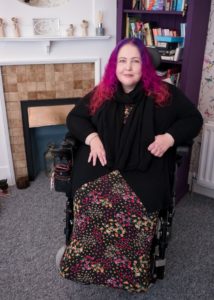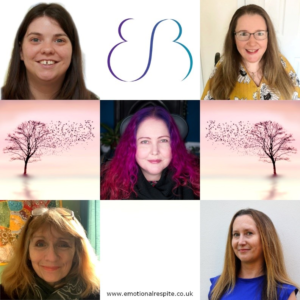My Journey into Becoming a Therapist
My Journey into Becoming a Therapist

Helen Rutherford MBACP (Accred) who has SMA Type II
The year was 1999. The millennium was looming. It feels like a lifetime ago but that is where it all began.
After 3 years at university, living in halls of residence, I found myself back home briefly in Northumberland. I was lucky to be offered an adapted ground-floor flat in Newcastle Upon Tyne so I returned to the city after a couple of months, happy to continue my journey into independence. I feel that independence has been my biggest achievement to date. Although I had not really enjoyed my business administration degree, I had loved the experience of being independent and making new friends. Once I moved into my flat, I found myself lacking focus and direction. You could say I felt lost. I struggled to see what lay ahead. Hopefully, not a life of daytime TV and being stuck in the house.
I decided to enrol on a night class in counselling; just a basic course run by a local college. I don’t remember putting a huge amount of thought into it. It was a way of meeting some new people and getting out of the house. I quickly made new friends and it pushed me outside my comfort zone. I had always struggled with shyness and talking to people would make me really anxious. But there was nowhere to hide on a course like this. You were invited to speak, practise counselling skills, and check in with the group every week. It was a small group, no more than 14 of us. I found myself engaging and connecting with the subject. It was bringing me out of my shell and helping me to develop my confidence. I quickly signed up for the next level the following year.
Whilst doing this course I received the devastating news that my breathing was deteriorating by 5% a year. It was at 40% at this point. I was referred to an orthopaedic surgeon who told me my heart and lungs were crowded, impacting on my ability to breathe due to the curvature of my spine. Usually, spinal fusions are performed in puberty. In my situation, being older complicated things. I was given the option to do nothing and I may live for 10 years, or have major reconstructive spinal surgery which would be life-threatening with no guarantees. My world fell away and I was grief-stricken. I didn’t want to die; I was scared and my options felt so unfair. I felt like there was little option at all. It’s a lot being faced with your own mortality at the age of 22. I decided to have the surgery. My focus quickly became tying up loose ends. I got the date for my surgery – 6 weeks before my night class finished. I threw myself into my coursework and handed it all in early.
After my surgery, I had multiple complications with infections resulting in many more surgeries over the following years. What should have been 10 days in the hospital had turned into a nightmare. This experience lasted several years and I nearly didn’t make it.
I had all the metal taken back out due to infection after 2 years. The spinal fusion failed; my bones had not fused. I was left in agony. The only possible cure was another spinal fusion. My body was spent, and my immune system too destroyed to fight any more infections. My options were either living in agony on opioids, just existing, or doing it all over again. The Consultant managing my infection warned me that my body would not tolerate another infection, but I knew I couldn’t live like this. After some time had passed, I decided to have the surgery again, then aged 28. Again, there were complications, and I had sepsis in my Hickman line (a line which goes from your chest wall directly into your heart). The surgery was rushed as they thought they were going to lose me, but they got the metal back in. An emergency operation followed to remove my Hickman line.
To say I had been through the mill is an understatement. On paper, I probably should not be here. Through all of this, I lost my sense of self and identity. I had to rebuild myself and my life from the ground up.
Fast forward 9 months, I found myself back in education, aged 29. This time my anxiety was much more severe and I experienced panic attacks at times. I knew I needed to push through this. I studied a fast-track level 3 in counselling and an HEFC in psychology. I didn’t know at that point what I wanted to focus on. Counselling eventually appealed so much more as it treated people as individuals with all of their nuances, something I have always felt was important. I signed up for the degree in Counselling. It was quite possibly one of the best decisions I have ever made in my life!
After getting my degree I went on to become accredited and studied to become a clinical supervisor. I have worked for many businesses, services and charities. I have developed my service Emotional Respite Disability Counselling Service over several years. I gathered together a team of counsellors who all identify as disabled who have vast knowledge and experience to help understand the people we support.

Emotional Respite Disability Counselling Service’s team:
Top left: Louise Brookes MBACP, Top Right: Liz Whiteley, Middle: Helen Rutherford MBACP Accred, Bottom Left: Libby Webber NCS Accred, Bottom Right: Frances Taylor MBACP.
Through my own experiences, I realised mental health was never the focus of my care, and there were no specialist providers who could have supported me with what I was going through. I am acutely aware that disabled people face daily challenges which may impact their mental health. I have worked tirelessly to present a mental health offering which is disability-led. I feel passionately that there should be support for some of the isolating experiences that you may go through as a disabled person. I wanted to create something where individuals felt understood and seen.
I am really proud and privileged to do the work I do. I am now 45 and it’s been a difficult and challenging journey. I’m glad it led me here.
Written by Helen Rutherford MBACP (Accred) register (No.065042)
Read Helen’s blog about Emotional Respite Disability Counselling service’s new 30-minute online counselling sessions for £25 which was launched at the beginning of February, 2023. Helen’s blog is entitled “The Therapeutic Hour – Another Barrier?”
